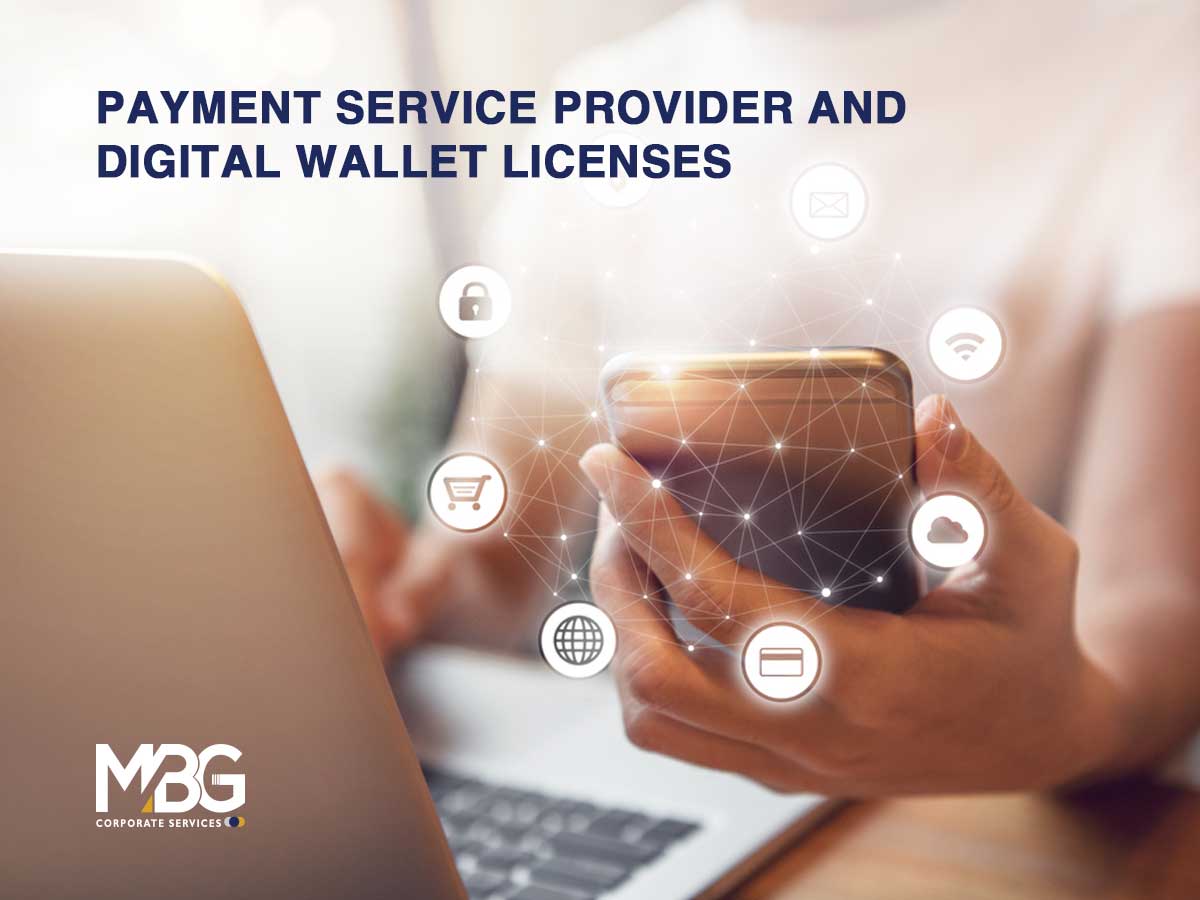Explaining Payment Service Provider And Digital Wallet In Electronic Payment
October 24, 2022

Payment Services Provider companies in the UAE are allowed to provide payment services on behalf of payment industry members such as telecommunication companies, public departments, and others besides, whether that is through payment kiosks or mobile phones. The process involves establishing networks, providing technology, supplying payment tools, hardware and software, and setting up data centers.
This license can be obtained with or without approval from the UAE Central Bank based on the nature of the business.
Digital Wallet for electronic payments in the UAE allows firms to provide digital wallets which refers (typically) to apps in smartphones and other electronic devices. These allow a person to make electronic transactions, including purchasing items online or at a store. The individual's bank account can also be linked to the digital wallet; alternatively, it can be on a rechargeable basis.
This activity needs proper approvals from the Central Bank UAE (CBUAE).
As per the latest notification in 2021, all existing license holders with ‘Payment Service Provider’ as activity and performing business related payment gateway services needed to have taken approval from CBUAE before 15th June 2022 to continue with their business.
The regulation came into force on 15 July 2021, and a one-year transitional period has been given to existing payment service providers and card schemes to obtain the relevant licenses.
CBUAE has categorized the activity into four types. A Person that intends to provide Retail Payment Services shall apply for one of the following categories of License:
- Category I License
- Category II License
- Category III License
- Category IV License
- Category I : An applicant must apply for a Category I license where it intends to provide one or more of the following Retail Payment Services:
- Payment Account Issuance Services;
- Payment Instrument Issuance Services;
- Merchant Acquiring Services;
- Payment Aggregation Services;
- Domestic Fund Transfer Services;
- Cross-border Fund Transfer Services;
- Payment Token Services
- Category II: An applicant must apply for a Category II license when it intends to provide one or more of the following Retail Payment Services:
- Payment Account Issuance Services;
- Payment Instrument Issuance Services;
- Merchant Acquiring Services;
- Payment Aggregation Services;
- Domestic Fund Transfer Services; and
- Cross-border Fund Transfer Services.
- Category III: An applicant must apply for a Category III license when it intends to provide one or more of the following Retail Payment Services:
- Payment Account Issuance Services
- Payment Instrument Issuance Services
- Merchant Acquiring Services
- Payment Aggregation Services
- Domestic Fund Transfer Services
- An Applicant must apply for a Category IV license when it intends to provide one or all of the following Retail Payment Services:
- Payment Initiation Services;
- Payment Account Information Services.
Initial Capital
- For obtaining a Category I License: Three (3) million Dirhams where the monthly average value of Payment Transactions amounts to ten (10) million Dirhams or above;
- For obtaining a Category II License: Initial capital of at least two (2) million Dirhams where the monthly average value of Payment Transactions amounts to ten (10) million Dirhams or above;
- For obtaining a Category III License: Initial capital of at least one (1) million Dirhams where the monthly average value of Payment Transactions amounts to ten (10) million Dirhams or above.
- For obtaining a Category IV License: Initial capital of at least one hundred thousand (100,000) Dirhams regardless of the monthly average value of Payment Transactions.
An applicant must provide information to the Central Bank on the source(s) of funds that constitute the initial capital as per paragraph (1).
What is a Payment Gateway? A payment gateway is a hardware and software complex that allows merchants to automate the process of accepting payments via the internet. The gateway is created by the payment system which defines its specification and is subsequently responsible for its technical support. Thanks to this development, a website is connected to the banking payment processing system. If you have the appropriate access, the bank processes and collects transactions that are conducted on your internet resource. Usually, the owners of sites or stores in the global network use payment gateways that banks or acquirers have provided. For large companies that simultaneously process a large number of monetary transactions, working with your payment program is much cheaper than with a rented one.
How to choose a Payment Gateway
The choice of a payment system primarily depends on the size of the company that owns the site. If a trading enterprise is relatively new and its turnover is low, working with an aggregator is worth considering. This will allow it to reach the maximum number of buyers. Among them, there will be cardholders of various banks and users of assorted electronic wallets.
| How a Payment Gateway Works | How a Digital Wallet works for Electronic Payment |
| Your customer places an order on your website by selecting their item's, and then checking out. Their information is securely transferred to the payment gateway and through that to the bank to authenticate the requested transaction. Once the authentication process has been completed (presuming it is not declined), the funds are then sent from the customer’s account to the payment gateway, and from there on to your company. The gateway will notify you of the progress. Once the payment is authorized, the amount will be quickly transferred to the merchant. | A digital wallet emulates a real, physical wallet by holding currency and keeping it handy for payments. A mechanism authenticates access and keeps transactions secure. Digital wallets ask users to enter their debit card or credit card numbers which are then encrypted to prevent misuse. After setting up the account, only the customer can access the wallet by entering their valid login credentials. This makes it device-independent. Even if a user loses the device, no one else can access their wallet. On the other hand, an authorized user can access and use the wallet from any other device. |








